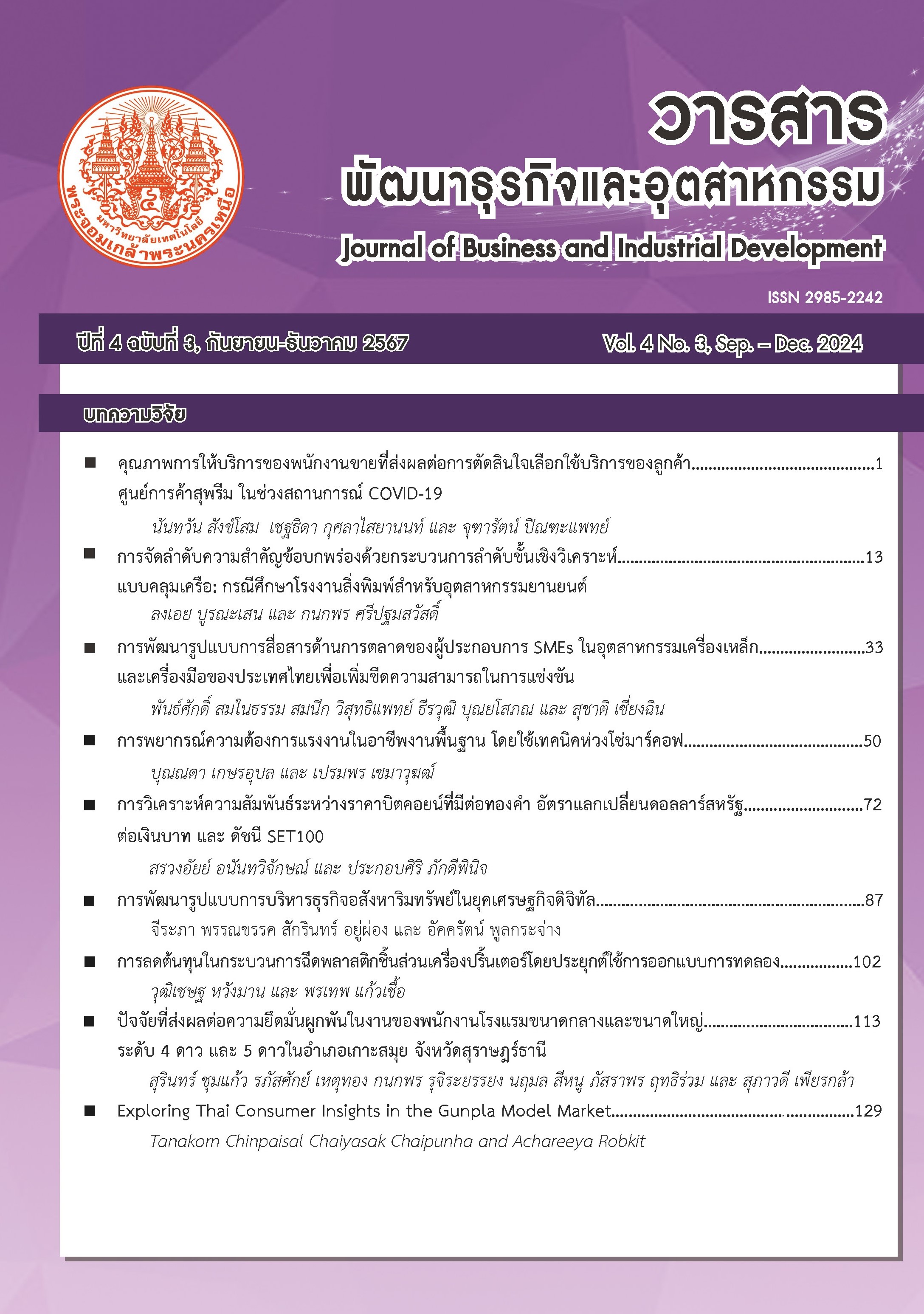ปัจจัยที่ส่งผลต่อความยึดมั่นผูกพันในงานของพนักงานโรงแรมขนาดกลางและขนาดใหญ่ระดับ 4 ดาว และ 5 ดาวในอำเภอเกาะสมุย จังหวัดสุราษฎร์ธานี
คำสำคัญ:
ธุรกิจโรงแรม, ความภาคภูมิใจแห่งตนในองค์การ, ความภาคภูมิใจแห่งตนเชิงสัมพันธ์กับหัวหน้างาน, การรับรู้ความสามารถแห่งตนทางอาชีพ, ความยึดมั่นผูกพันในงานบทคัดย่อ
การวิจัยครั้งนี้มีวัตถุประสงค์เพื่อศึกษา 1) ความสัมพันธ์ระหว่างความภาคภูมิใจแห่งตนในองค์การ ความภาคภูมิใจแห่งตนเชิงสัมพันธ์กับหัวหน้างาน และการรับรู้ความสามารถแห่งตนทางอาชีพ กับความยึดมั่นผูกพันในงาน และ 2) อำนาจการทำนายร่วมกันของตัวแปรอิสระ 3 ตัวแปร ที่มีต่อความยึดมั่นผูกพันในงาน กลุ่มตัวอย่างคือ พนักงานประจำคนไทยในระดับปฏิบัติการจำนวน 186 คน ที่ปฏิบัติงานอยู่ในโรงแรมขนาดกลางและขนาดใหญ่ระดับ 4 และ 5 ดาวในอำเภอเกาะสมุย จังหวัดสุราษฎร์ธานี จำนวน 6 แห่ง เก็บรวบรวมข้อมูลโดยใช้แบบสอบถามเป็นเครื่องมือวิจัย สถิติที่ใช้ในการวิเคราะห์ข้อมูล ได้แก่ ค่าร้อยละ ค่าเฉลี่ย ส่วนเบี่ยงเบนมาตรฐาน ค่าสัมประสิทธิ์สหสัมพันธ์แบบเพียร์สัน และการวิเคราะห์สมการถดถอยพหุคูณแบบขั้นตอน ผลการวิจัยพบว่า 1) ความภาคภูมิใจแห่งตนในองค์การ ความภาคภูมิใจแห่งตนเชิงสัมพันธ์กับหัวหน้างาน และการรับรู้ความสามารถแห่งตนทางอาชีพมีความสัมพันธ์เชิงบวกกับความยึดมั่นผูกพันในงานของพนักงานอย่างมีนัยสำคัญทางสถิติที่ระดับ .01 (r = .494, r = .429 และ r = .531 ตามลำดับ) และ 2) การรับรู้ความสามารถแห่งตนทางอาชีพและความภาคภูมิใจแห่งตนในองค์การสามารถร่วมกันทำนายความยึดมั่นผูกพันในงานได้ร้อยละ 36.0 อย่างมีนัยสำคัญทางสถิติที่ระดับ .001 อย่างไรก็ตามความภาคภูมิใจแห่งตนเชิงสัมพันธ์กับหัวหน้างานไม่สามารถทำนายความยึดมั่นผูกพันในงานได้
เอกสารอ้างอิง
Pholphirul, P. (2013). Roles of Thai Small and Medium Enterprises Under Creative Economy. NIDA Economic Review, 7(1), 205–250. (in Thai)
Dechawatanapaisal, D. (2022). Organizational Behavior: Theory and Application. Bangkok: Chulalongkorn University Press. (in Thai)
Bakker, A. B., & Demerouti, E. (2008). Towards a Model of Work Engagement. Career Development International, 13(3), 209–223.
Chen, G., Goddard, T. G., & Casper, W. J. (2004). Examination of the Relationships Among General and Work‐Specific Self‐Evaluations, Work‐Related Control Beliefs, and Job Attitudes. Applied Psychology, 53(3), 349–370.
Schaufeli, W. B., Salanova, M., González-Romá, V., & Bakker, A. B. (2002). The Measurement of Engagement and Burnout: A Two Sample Confirmatory Factor Analytic Approach. Journal of Happiness Studies, 3, 71–92.
Smithikrai, C., & Pusapanich, P. (2017). Factors Influencing Work Engagement and Organizational Commitment of Chiang Mai University Staff. Kasetsart Journal of Social Sciences, 38(2), 655–667.
Kim, M., & Beehr, T. A. (2018). Challenge and Hindrance Demands Lead to Employees' Health and Behaviors Through Intrinsic Motivation. Stress and Health, 34(3), 367–378.
Pierce, J. L., Gardner, D. G., Cummings, L. L., & Dunham, R. B. (1989). Organization-Based Self-Esteem: Construct Definition, Measurement, and Validation. Academy of Management Journal, 32, 622–648.
Landry, G., & Vandenberghe, C. (2009). Role of Commitment to the Supervisor, Leader-Member Exchange, and Supervisor-Based Self-Esteem in Employee-Supervisor Conflicts. The Journal of Social Psychology, 149(1), 5–28.
Rigotti, T., Schyns, B., & Mohr, G. (2008). A Short Version of the Occupational Self-Efficacy Scale: Structural and Construct Validity Across Five Countries. Journal of Career Assessment, 16(2), 238–255.
Sorod, B. (2012). Research Methodology in Human Resource and Organization Development. Bangkok: M N Compute Offset. (in Thai)
Burn, N., & Grove, S. K. (2005). The Practice of Nursing Research: Conduct, Critique & Utilization (5th ed.). Philadelphia: W. B. Saunders.
Sangchoey, T., Jindachote, P., & Mongkolnimit, S. (2021). Generation Y: Affective Organizational Commitment and Intention to Stay. Silpakorn University e-Journal, 41(3), 50–62. (in Thai)
Schaufeli, W. B., Bakker, A. B., & Salanova, M. (2006). The Measurement of Work Engagement with a Short Questionnaire: A Cross-National Study. Educational and Psychological Measurement, 66(4), 701–716.
Silpcharu, T. (2020). Research and Statistical Analysis with SPSS and AMOS. Bangkok: Business R&D. (in Thai)
Nunnally, J. C. (1978). Psychometric Theory (2nd ed.). New York: McGraw Hill.
Hair, J. F., Jr., Black, W. C., Babin, B. J., & Anderson, R. F. (2010). Multivariate Data Analysis: A Global Perspective (7th ed.). New Jersey: Pearson Prentice Hall.
Costantini, A., Ceschi, A., Viragos, A., De Paola, F., & Sartori, R. (2019). The Role of a New Strength-Based Intervention on Organization-Based Self-Esteem and Work Engagement: A Three-Wave Intervention Study. Journal of Workplace Learning, 31(3), 194–206.
Filosa, L., & Alessandri, G. (2024). Longitudinal Correlated Changes of Global and Organization‐Based Self‐Esteem at Work. Applied Psychology, 73(1), 381–405.
Gordon, J. R., & Hood, E. (2021). Organization-Based Self-Esteem and Work-Life Outcomes. Personnel Review, 50(1), 21–46.
PM, N., Jose, G., Vincent, M. T. P., & John, A. (2023). Workplace Bullying, Engagement and Employability: Moderating Role of Organization-Based Self-Esteem. Employee Responsibilities and Rights Journal, 35(3), 417–432.
Korman, A. K. (1970). Toward an Hypothesis of Work Behavior. Journal of Applied Psychology, 54(1), 31.
Korman, A. K. (1976). Hypothesis of Work Behavior Revisited and an Extension. Academy of Management Review, 1(1), 50–63.
Clauss, E., Hoppe, A., Schachler, V., & O’Shea, D. (2021). Occupational Self-Efficacy and Work Engagement as Moderators in the Stressor-Detachment Model. Work & Stress, 35(1), 74–92.
Guarnaccia, C., Scrima, F., Civilleri, A., & Salerno, L. (2018). The Role of Occupational Self-Efficacy in Mediating the Effect of Job Insecurity on Work Engagement, Satisfaction and General Health. Current Psychology, 37, 488–497.
ดาวน์โหลด
เผยแพร่แล้ว
รูปแบบการอ้างอิง
ฉบับ
ประเภทบทความ
สัญญาอนุญาต
ลิขสิทธิ์ (c) 2024 วารสารพัฒนาธุรกิจและอุตสาหกรรม

อนุญาตภายใต้เงื่อนไข Creative Commons Attribution-NonCommercial-NoDerivatives 4.0 International License.





